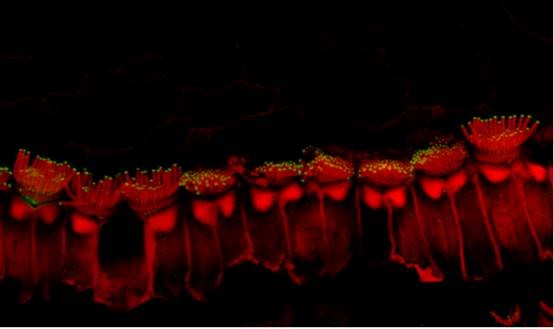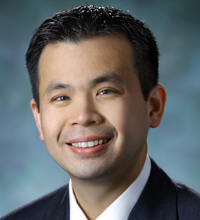On Tuesday, June 16, 2020, Wade Chien, M.D., will discuss the exciting field of gene therapy research and its potential promise for treating some forms of hearing and balance disorders. There is no cure for hearing loss, although technologies such as hearing aids and cochlear implants can help some people hear better. Moreover, few options are available for those with chronic balance disorders. Scientists are seeking treatments to replace or repair damaged hair cells in the inner ear that are responsible for a range of hearing and balance disorders. Dr. Chien’s lab is using gene therapy techniques in mice to try to stop the symptoms of these disorders—and to treat or reverse damage to the inner ear caused by gene mutations.
- What: “The promise of gene therapy for hearing and balance disorders,” part of the NIDCD Beyond the Lab, Understanding Communication Disorders speaker series
- Who: Wade Chien, M.D., otolaryngology surgeon-scientist in the NIDCD Inner Ear Gene Therapy Program
- When: Tuesday, June 16, 2020, noon-1pm Eastern time
- Where: You can view the presentation on the NIH videocast website.
This lecture is part of a series of talks led by researchers from the National Institute on Deafness and Other Communication Disorders (NIDCD), part of the National Institutes of Health, called Beyond the Lab, Understanding Communication Disorders. The speaker series is an opportunity for everyone inside and outside of the NIH—administrative staff, support staff, scientists, and the public—to learn about the NIDCD’s recent advances in communication disorders, conditions that significantly affect about 20 percent of U.S. adults during their lifetime.

Enhanced microscopic image showing hair-like projections (stereocilia) on the sensory hair cells in the inner ear of a mouse model treated with inner ear gene therapy. The mouse has a genetic form of deafness that causes the stereocilia to be short and defective. Gene therapy elongated the stereocilia and improved hearing.
Source: Kevin Isgrig, NIDCD
Dr. Chien is an NIDCD otolaryngology (diseases of the ear and throat) surgeon-scientist, and principal investigator of the NIDCD Inner Ear Gene Therapy Program. Dr. Chien’s lab uses mouse models of hearing and balance disorders to test how sensory hair cells in the inner ear respond to gene therapy. He will discuss exciting recent work from his lab on inner ear gene therapy for deafness and dizziness.
Hearing loss is central to the mission of the NIDCD. Researchers have identified dozens of genetic factors associated with hearing loss.
This live webcast will be captioned and will be available for later viewing. Individuals with disabilities who need sign language interpreting and/or other reasonable accommodations to participate in this event should contact Lonnie Lisle (telephone: 240-464-4355) and/or the Federal Relay (800-877-8339) by June 11.
About the Speaker

Wade Chien, M.D., joined the NIDCD as an investigator in the Otolaryngology Surgeon-Scientist Program in 2011. He is also an associate professor in the department of otolaryngology-head and neck surgery at the Johns Hopkins School of Medicine. He received bachelor's degrees in biology and music from Brandeis University and an M.D. from the University of Southern California Keck School of Medicine. He completed otolaryngology residency training in the Harvard Combined Otolaryngology Residency Program at Massachusetts Eye and Ear Infirmary, and a neurotology fellowship at the Johns Hopkins Hospital. He is an alumnus of the Howard Hughes Medical Institute-National Institutes of Health Research Scholars Program, during which he worked with Dr. Gerald Fischbach to study the effects of neurotrophins in the neuromuscular junction. He is also a recipient of an NIH T32 training grant in residency, during which he studied middle ear mechanics under the guidance of Dr. Saumil Merchant and Dr. John Rosowski.

